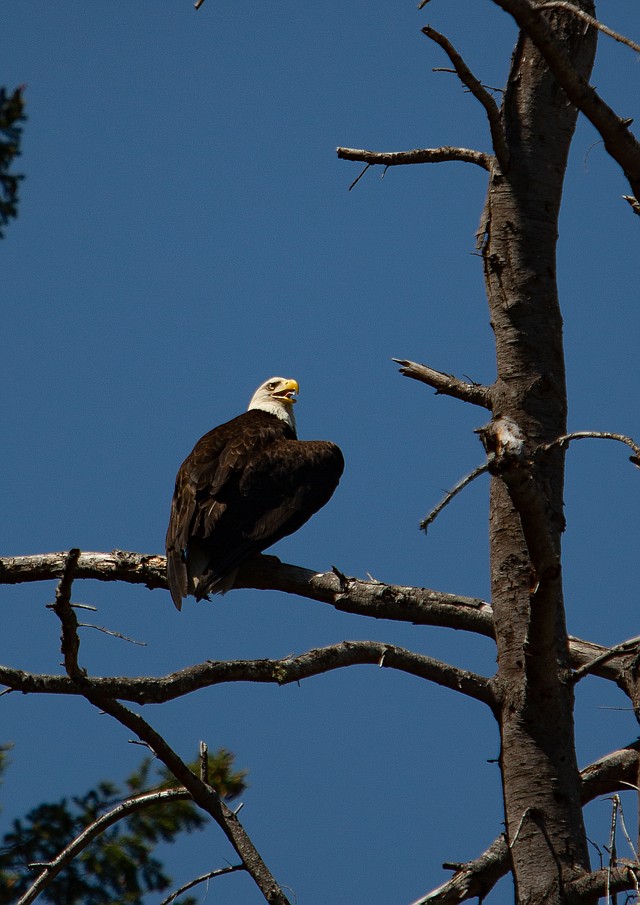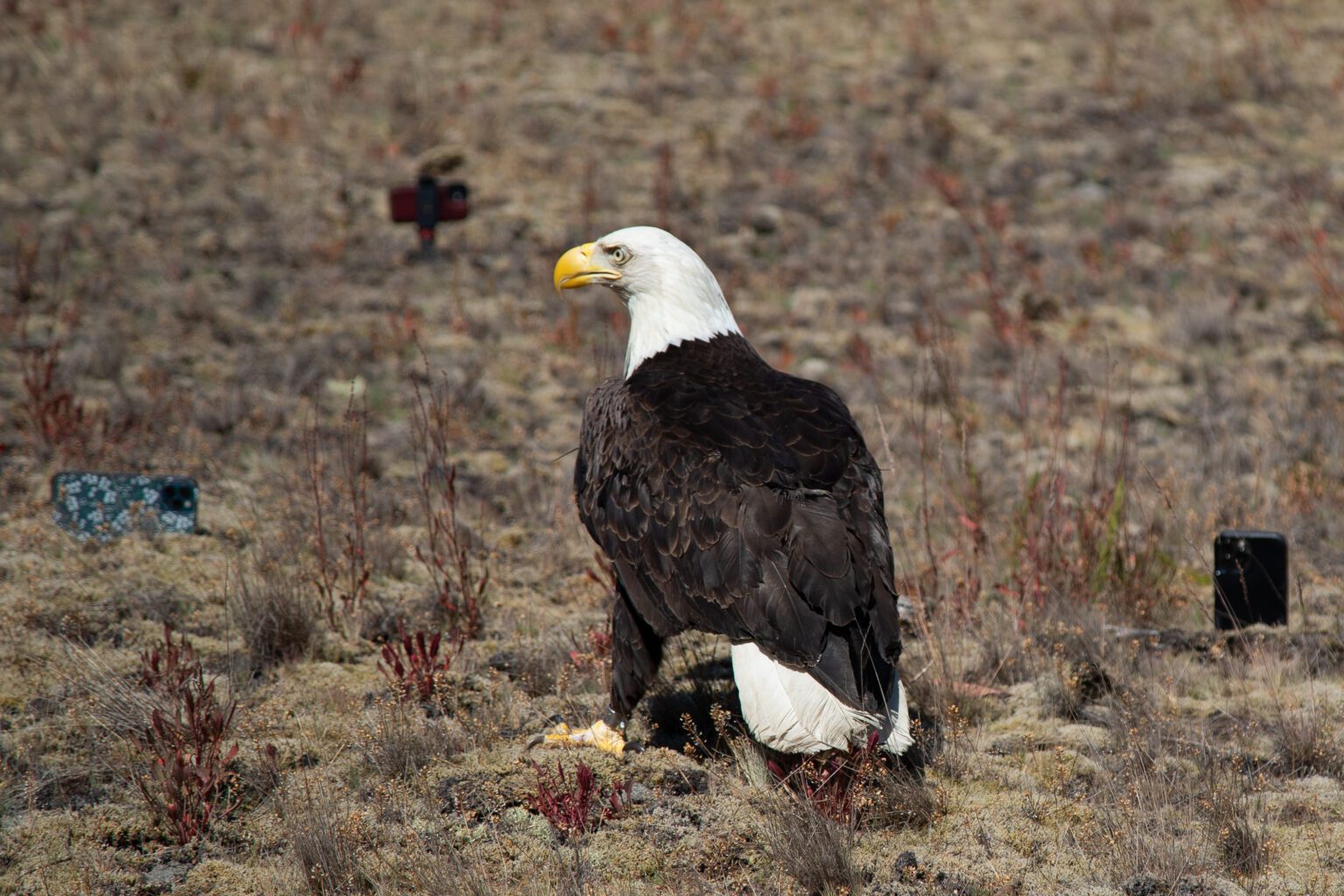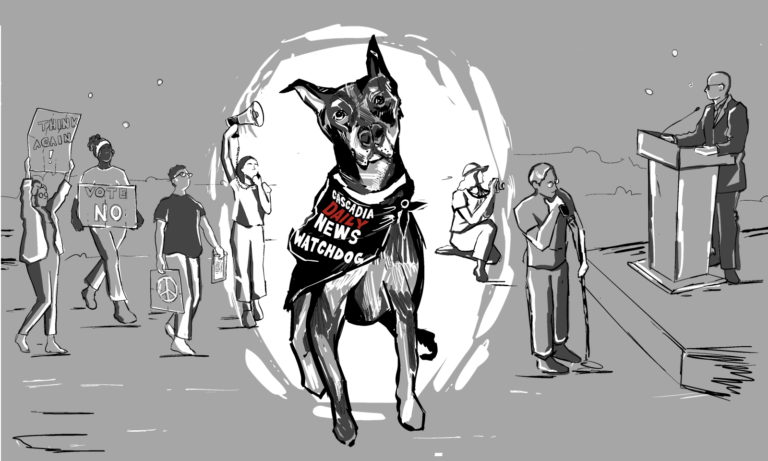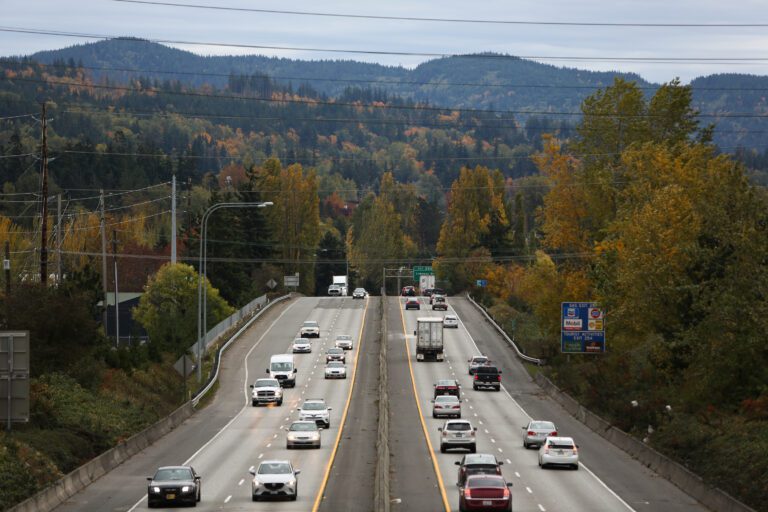LA CONNER – A 5-year-old bald eagle, once suffering from severe lead poisoning, has been returned to the wild after more than 40 days of rehabilitation at the Progressive Animal Welfare Society (PAWS).
The eagle spent 43 days at PAWS after she was rescued from the Hole in the Wall waters of La Conner.
“I found this eagle out on the jetty,” said Ted Edge Jr., a La Conner crabber and Swinomish tribal member. “I thought it was just a seagull taking a bath, but as soon as I got closer to it, I saw it was an eagle and I could tell it was in distress, looking for help desperately.”
 Ted Edge Jr. puts on gloves before releasing the bald eagle he saved from its cage after rehabilitation. (Hailey Hoffman/Cascadia Daily News)
Ted Edge Jr. puts on gloves before releasing the bald eagle he saved from its cage after rehabilitation. (Hailey Hoffman/Cascadia Daily News)
Edge said the eagle swam straight for his boat — a crabbing vessel named Baby Girl operated by his sister, Heather, and owned by Donald Damian — and when Edge put his crab hook into the water, the eagle latched on.
“The bird was so strong — it pulled itself on the hook and started to work its way up, and I was just trying to bring it on board,” he said.
Once the bird was safely on board, Edge could tell she needed more help. His cousin’s father, also on board, called 911 while Edge wrapped her in a dry burlap potato sack.
“It just sat there, exhausted,” he said. “You know how animals get really cold in the water? I’ve never seen an eagle get so cold, and just shivering like a dog.”
After testing, the eagle was diagnosed with lead poisoning, which can cause significant health issues, including inability to fly, loss of use in their legs, heart and lung conditions, loss of vision and death.
Lead poisoning is common in eagles, which pick up lead consumed by their prey. A study released in Science in February found that 46% of sampled bald eagles in the United States – more than 1,000 across 38 states – contained dangerous levels of lead.
“Almost half of all animals sampled had chronic, toxic levels of lead,” according to the study. “Lead poisoning is an underappreciated but important constraint on continent-wide populations of these iconic protected species.”
 The eagle sits high in a tree after taking it’s first flight in more than 40 days. The bird suffered from lead poisoning and lost the ability to fly. (Hailey Hoffman/Cascadia Daily News)
The eagle sits high in a tree after taking it’s first flight in more than 40 days. The bird suffered from lead poisoning and lost the ability to fly. (Hailey Hoffman/Cascadia Daily News)
After 43 days of rehabilitation, though, PAWS Naturalist Jeff Brown said this eagle was healthy enough to return to La Conner.
“We were really worried the eagle wasn’t going to recover,” Brown said after the bird was released on Thursday. “We just had to get the lead out as quick as we can.”
Brown said the bird is in much better shape than when she arrived, showing improved stamina, taking longer flights and eating again.
Mick Szydlowski, the communications director for PAWS, said they see over 4,000 animals each year.
“We average about 160 different species, and eagles are a big part of that,” he said. “We get everything from bobcats, hummingbirds, harbor seals, waterfowl, albatross and a lot of black bears.”
Rarely does the organization treat lead-poisoned eagles, though. A majority of the eagles that come through their doors are a result of vehicle collisions, he said.
 Ted Edge Jr., left, and Jeff Brown from the Progressive Animal Welfare Society carry the bald eagle into a field for release. (Hailey Hoffman/Cascadia Daily News)
Ted Edge Jr., left, and Jeff Brown from the Progressive Animal Welfare Society carry the bald eagle into a field for release. (Hailey Hoffman/Cascadia Daily News)
Syzdlowski, Brown, Edge and his family gathered off the Hole in the Wall Thursday afternoon to release the eagle.
“It’s good to come full circle,” Edge said. “My family and I are heartwarmed by this. It’s an amazing experience to get to see it go back to its habitat … and just taking care of what’s been on this earth for generations.”
 Members of Ted Edge’s family also watched the bald eagle release. (Hailey Hoffman/Cascadia Daily News)
Members of Ted Edge’s family also watched the bald eagle release. (Hailey Hoffman/Cascadia Daily News)




